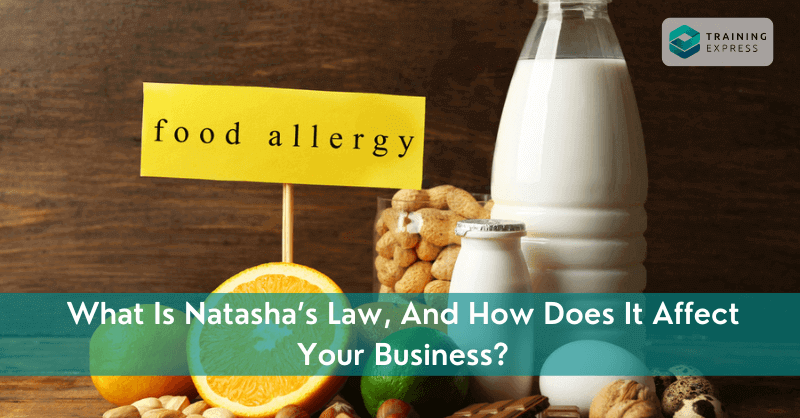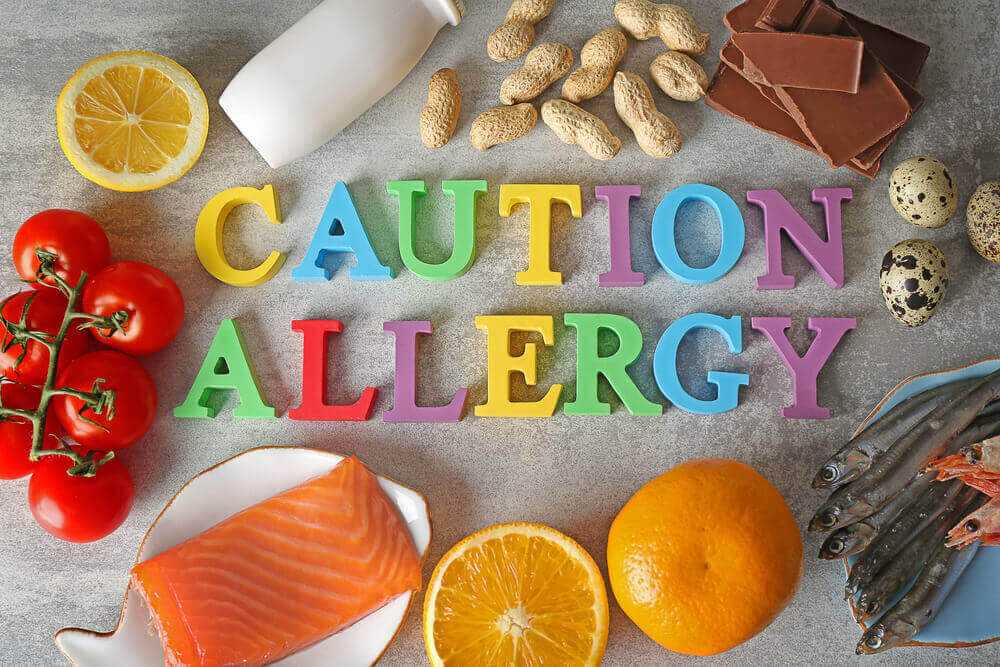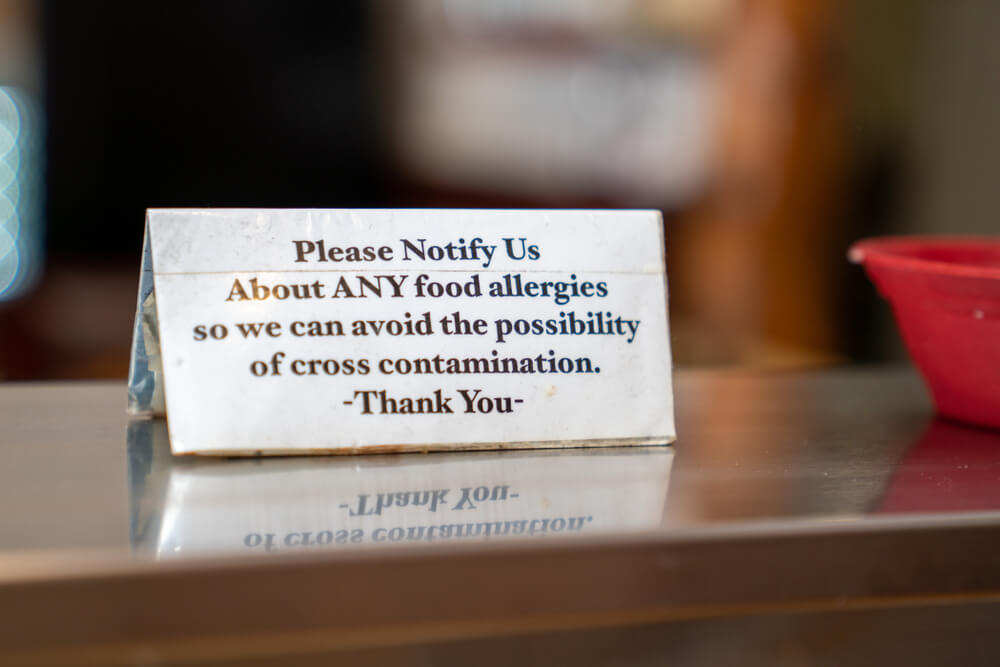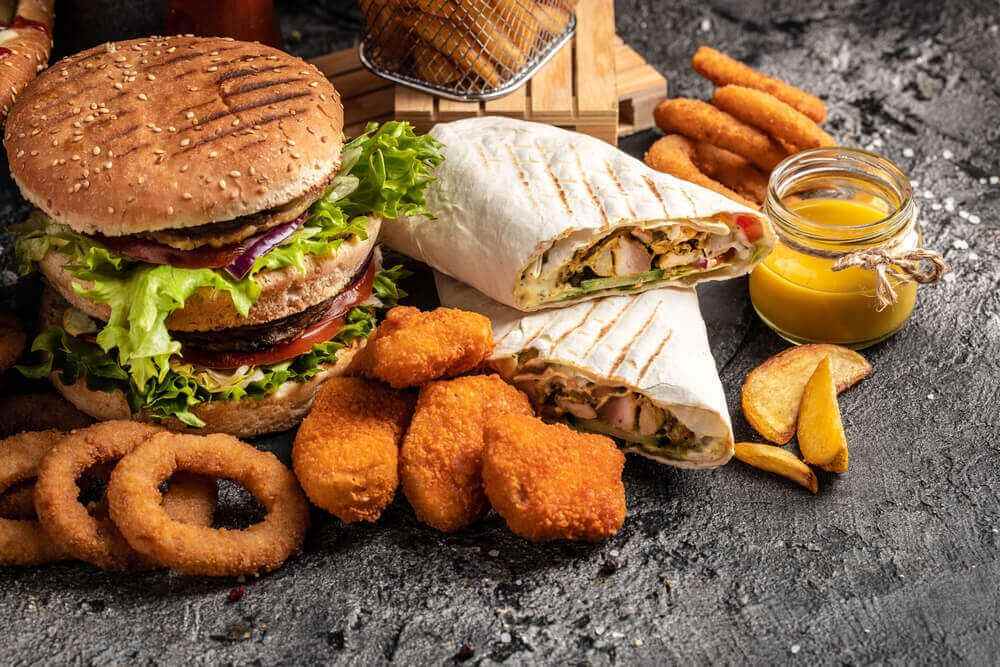

In today’s world, food allergies are a severe concern for many people. To protect consumers with food allergies, the UK government introduced Natasha’s Law in October 2021. This law requires food businesses to provide clear and accurate allergen information on pre-packed for Direct Sale (PPDS) food. But what does this mean for your business?
In this blog, we’ll discuss Natasha’s Law, its background and history, what companies need to know about allergen labelling, and how it affects your business. Whether you’re a café owner, restaurateur, caterer, or run a kitchen, it’s essential to understand the requirements and ensure that you comply with Natasha’s Law. So let’s dive in and explore the impact of this crucial legislation.
In this blog, you’ll learn about the following:
Table of Contents
What is Natasha’s Law?
Natasha’s Law is a new UK food labelling legislation named after Natasha Ednan-Laperouse, who suffered an allergic reaction to a baguette purchased from Pret A Manger at Heathrow Airport in 2016. The Law requires all pre-packaged foods sold loose, such as sandwiches, salads, and baked goods, to display all ingredients labelling, including allergens, on the packaging.
In addition, from October 2021, all pre-packed food for direct sale (PPDS) needs to reveal a list of all ingredients on the food labels of particular products. Nowadays, Natasha’s Law applies to all businesses in the UK, particularly in the food business.
Why is it called Natasha’s Law?
Natasha’s Law is named in memory of Natasha Ednan-Laperouse, who died from an allergic reaction after eating a baguette from Pret A Manger. Natasha had a sesame allergy. Unfortunately, she was unaware that sesame seeds had been baked into the bread of a sandwich she had bought. The Law is named after Natasha to commemorate her life and to raise awareness about the significance of allergen labelling for those with food allergies.
Natasha’s death brought attention to the issue of food labelling and the lack of clear allergen information on pre-packaged foods. Her parents campaigned for changes in the Law to improve food safety for individuals with allergies.

Why is Natasha’s Law so important?
Natasha’s Law is essential because it saves lives. The Law protects individuals with food allergies who rely on the clarity of food ingredients and food labelling for pre-packed foods. It must have full compliance, or lives will continually be in danger.
Besides, the importance of Natasha’s Law lies in its ability to improve food safety for people with allergies. The Law requires that food businesses display allergen information on pre-packaged foods, including those sold loose, like sandwiches, salads and baked goods.
This makes it easier for individuals with allergies to know what they eat. Also, it reduces the risk of life-threatening reactions. In addition, the Law helps to protect the health and well-being of people with allergies and raises awareness about the importance of allergen labelling in the food industry.
Natasha’s Law in 2022 – Update
The law’s introduction in 2022 has significantly changed how food businesses handle and label their products. It has also increased awareness about allergen labelling and food safety for individuals with allergies. Besides, in the first year of implementation, enforcement agencies focused on educating food businesses about their obligations under the law and ensuring they are fully compliant with the new regulations.
Moreover, The Food Standards Agency (FSA) has launched the Speak Up For Allergies campaign to inform customers about their food allergy to food business staff. Research shows that children and young people are at a higher risk of experiencing food allergy reactions. Further, the FSA advises young people to speak up when they visit and order foods to ensure their allergies are fully understood by the person taking the order.

What Businesses Need to Know about the Allergen Labelling for PPDS Food.
Any businesses that produce or handle Pre-Packed for Direct Sale (PPDS) food must be aware of the allergen labelling requirements. For example, sandwiches, salads, baked goods, and confectionery.
Additionally, this labelling helps protect your consumers by providing related life-saving allergen information on the packaging. Moreover, businesses must comply with the allergen labelling requirements under Natasha’s Law to avoid potential legal liabilities.
Non-PPDS food
Non-Pre-Packed for Direct Sale (PPDS) food refers to food not packaged at the same premises from where it is sold and intended for later consumption. Examples of non-PPDS food include
- Tinned or packaged goods;
- Ready meals and Ice-cream;
- Restaurant and take-away meals;
- Catering and event food;
- Food sold in supermarkets and grocery stores;
- Baked goods such as cakes, pastries, and bread.
Notably, for non-PPDS food, allergen information must be displayed, but the labelling requirements may differ from PPDS food. Therefore, businesses must understand and comply with the allergen labelling requirements for PPDS and non-PPDS food to ensure the safety of individuals with allergies.
Labelling Requirements
There are some strict labelling requirements of Natasha’s Law. The labelling requirements for pre-packed for direct sale (PPDS) food under this law are as follows:
- First: Businesses must clearly display allergen information for each ingredient in PPDS food, including any allergens present.
- Second: Businesses must display 14 allergen information on the packaging itself or nearby and be legible, clear, and in a font size no smaller than the minimum size specified by the regulations.
- Third: Businesses must have procedures to ensure the accuracy of allergen information and provide allergen information to customers upon request.
- Fourth: Businesses must comply with these requirements and may face enforcement action, fines, and legal liabilities if they do not.
In addition, non-PPDS food requires a label with the following: name of the food, allergens present in the food, a meat content declaration for meat products, and an irradiated food statement for irradiated food.
What are the Symbols on Food Packaging?
Food packaging symbols protect the food, convey information to consumers, extend shelf life, provide comfort, attract customers, and promote environmentally-friendly packaging. There are several symbols commonly found on food packaging, such as:
- Expiration Date: Indicates the date to which the food product will maintain its quality and taste if stored properly.
- Storage instructions: Indicate the product’s recommended temperature, humidity, and storage conditions.
- Nutritional information: Provides information about the food’s calorie content, fat content, sodium content, etc.
- Ingredients list: Lists all the ingredients used in the product in descending order of weight.
- Allergen warnings: Indicates if the product contains allergens, such as peanuts, dairy, or gluten.
- Organic or Natural labels: Indicates if the product was produced using organic methods or contains only natural ingredients.
- Country of origin: Indicates where the product was manufactured or produced.
- Recycling symbols: Indicates the type of packaging material and whether it is recyclable or not.
Additionally, these symbols provide essential information about the food product and help consumers make informed choices about what they eat.
Distance Selling
The concept of ‘Distance selling’ refers to selling goods or services to consumers who are not physically present in the exact location of the seller. Distance selling covers selling goods, services or digital content without face-to-face contact with consumers. For example: online, phone, mail order etc.

Food Business’ Responsibilities Under Natasha’s Law
Businesses must follow some directions for selling PPDS food. The law, which took effect on October 1, 2021, requires businesses to list all ingredients, including allergens, on the packaging of PPDS food. Besides, the law requires that all food sold pre-packaged for direct sale (PPDS) in the UK must include a complete list of ingredients, including allergens, on the packaging.
Additionally, businesses that sell PPDS food must ensure that their packaging complies with the new labelling requirements. So, if you run a business in the UK, it’s essential to understand and follow the requirements of Natasha’s Law to ensure that your food labelling is compliant. Notably, failure to comply with Natasha’s Law could result in penalties for businesses.
What Does Natasha’s Law Mean for My Business?
For my business, this means that I must identify and declare all allergens in the ingredients used in my pre-packaged food, either on the packaging itself or through other means, such as menus or signs in the establishment. Also, failure to comply with Natasha’s Law can result in legal penalties for my business.
Compliance to Natasha’s Law
To comply with Natasha’s Law in the UK, businesses that sell food pre-packaged for direct sale (PPDS) must take steps to accurately label their food products. Additionally, businesses must ensure that food packages or labells contain all relevant information, such as the presence of any allergens that could pose a risk to consumers. Failing to comply with Natasha’s Law could result in penalties for businesses.
Therefore, companies need to stay informed about the requirements of the law and regularly review their labelling practices to ensure they are meeting the necessary standards. By doing so, they can help protect consumers and avoid any legal consequences.

What Does Natasha’s Law Require of Food Businesses from October 2021
Here is a quick overview of how the Law applies to different sectors of the food industry:
First: Restaurants
Natasha’s Law does not directly apply to restaurant services. Although restaurants prepare and serve food in the same facility, the dishes are not repacked, which is a prerequisite for the labelling requirement. In addition, the Law will only apply to restaurants if they offer grab-and-go meals.
Despite this, restaurants are not exempt from providing allergen information regarding their food product. However, allergen information must be available in writing or through providing the information verbally by the staff. For example, allergen information can be provided through allergen food safety posters or by indicating them on the menu.
Second: Cafés & Delis
Cafés, including delis, are some of the leading food businesses affected by Natasha’s Law. Such companies often produce food products, such as salads, sandwiches, and pastries, on-site, pack them, and display them for service.
Further, the packaging used to contain these food products must be appropriately labelled with a complete ingredient list, emphasising any food allergen present. Deli shops that offer prepackaged foods are subject to indicate this information as well, but not with made-to-order foods.
Third: Kitchens and Caterers
Both catering operations and commercial kitchens deal with high volume production of foods. Therefore, only if foods are prepackaged in singles, commercial kitchens and catering businesses are not obliged by Natasha’s Law to print allergen information on their products.
While the above information is accurate, commercial kitchens and caterers must train their staff on properly handling food allergens and provide adequate information to their customers.
To correctly comply with Natasha’s Law, get a deeper understanding of Food Labelling Regulations.

8 Things You Need to Know about Natasha’s Law:
- One: Natasha’s Law labels are not required for everything. Only pre-packaged food items must have allergen information clearly labelled.
- Two: Allergen matrices or equivalents will still need to be maintained. This means that food businesses must keep records of all allergens in their ingredients, even if they are not required to label them on pre-packaged food items.
- Three: Labelling information is split into mandatory and voluntary types. The Law requires the declaration of allergens known to cause severe reactions in some individuals, such as peanuts, eggs, and milk.
- Four: The requirements do not extend to distance selling. If a food business only sells pre-packaged food items online or by mail order, they are not required to comply with Natasha’s Law.
- Five: There is a need for change. Natasha’s Law is a new regulation, and food businesses may need to change their practices and processes to comply with the new requirements. This could include updating packaging or labelling, training employees, and maintaining allergen records.
- Six: The Law applies to all food businesses in the UK. This includes cafés, delis, restaurants, takeaways, caterers, and kitchens that sell pre-packaged food items.
- Seven: The Law requires clear and concise allergen labelling. The information must be visible, legible, and displayed in a prominent location on the packaging.
- Eight: Allergen information should be accurate and up-to-date. If a food business changes its ingredients or recipe, it must update its allergen information accordingly.
Moreover, failure to comply with Natasha’s Law can result in legal penalties. Food businesses that do not comply with the new regulations may face fines and other penalties. Additionally, non-compliance can harm the reputation of the business and damage customer trust.
Summary
Natasha’s Law is a UK regulation aimed at improving food safety for consumers with allergies. The Law requires all food businesses to clearly label allergenic ingredients on pre-packaged food, including food made on the premises, regardless of the company’s size.
In addition, the Law was introduced on October 1, 2021, and is named after Natasha Ednan-Laperouse, who died from an allergic reaction caused by unlabelled food. This Law is a significant step in ensuring the safety of those with food allergies in the UK.
Check out our course to learn more about Food Labelling Regulations.
FAQ
What kind of allergen information is considered mandatory and what is considered voluntary?
The law requires the declaration of allergens known to cause severe reactions in some individuals, such as peanuts, eggs, and milk. Food businesses may also label additional allergens, but this is not mandatory.
Does Natasha’s Law apply to all food items sold in England?
No, Natasha’s Law only applies to pre-packaged food items. Food items not pre-packaged, such as menu items in restaurants or takeaways, are not covered by the regulations.
What kind of legal penalties can food businesses face for non-compliance with Natasha’s Law?
The penalties for non-compliance with Natasha’s Law include fines, legal action, and other liabilities. The specifics will depend on the breach’s severity and the case’s particular circumstances. Therefore, food businesses should consult with legal experts if they have any questions or concerns about compliance.
What are the 14 food allergies?
The 14 most common food allergies are-
1. Peanuts
2. Tree nuts (such as almonds, cashews, and walnuts)
3. Fish
4. Shellfish
5. Milk
6. Eggs
7. Wheat
8. Soy
9. Sesame seeds
10. Corn
11. Rye
12. Barley
13. Lentils
14. Mustard seeds.
Do I need to label allergens in food items that I sell online or by mail order?
No, the requirements of Natasha’s Law do not extend to distance selling.
Learn More
- Available Courses
- Career Bundles72
- Animal care5
- Law8
- Quality Licence Scheme Endorsed111
- Teaching13
- Teaching & Academics Primary27
- Accounting & Finance Primary30
- Training3
- Design9
- IT & Software44
- Healthcare126
- Marketing31
- Health and Safety402
- Construction48
- Electronics25
- Hospitality22
- Health and Social Care219
- Child Psychology37
- Management375
- Business Skills268
- First Aid70
- Employability264
- Safeguarding75
- Food Hygiene103
- Personal Development1277
 Food Hygiene
Food Hygiene Health & Safety
Health & Safety Safeguarding
Safeguarding First Aid
First Aid Business Skills
Business Skills Personal Development
Personal Development












